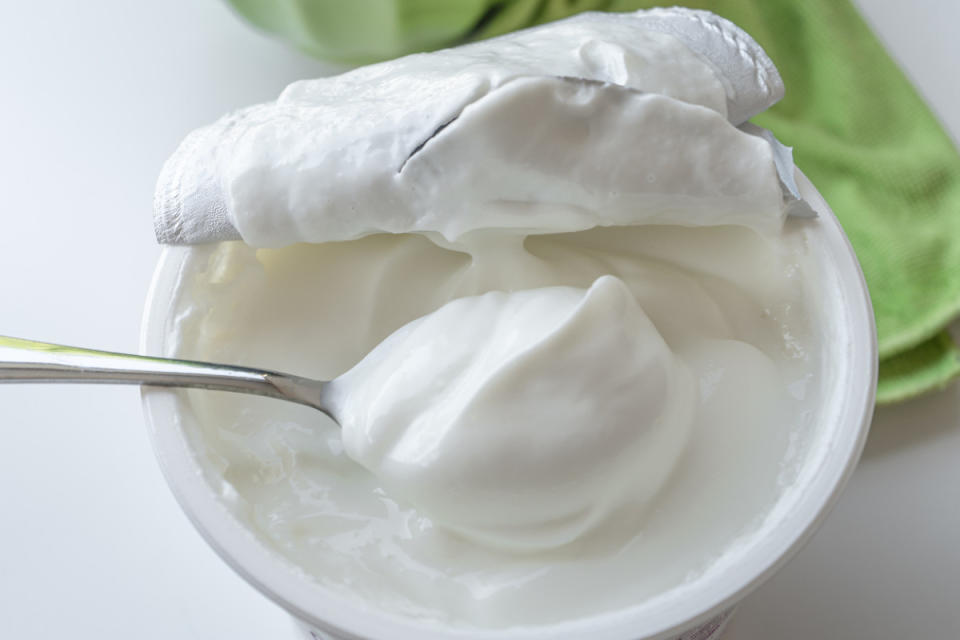Wait, What's the Difference Between Greek Yogurt and Regular Yogurt?

Bowl of yogurt with berries and granola
Whether you grocery shop at Aldi, Trader Joe's, Costco, Walmart or your local supermarket (we see you, Kroger), you've probably noticed that the world of yogurt has exploded over the years. These days, you have dozens of options: plain, flavored, low-fat, no-fat, full-fat. And that's even before we get to the different yogurt styles.
One of the biggest areas of recent yogurt growth has been in the Greek yogurt category. The thick, tangy option is prized for its protein content, but what else do you need to know before you buy? And what's the difference between Greek yogurt and regular yogurt? We talked to registered dietitians to find out what you need to know for your next trip down the dairy aisle.
Related: The Best Yogurts You Can Buy at the Grocery Store

iStock
What is Regular Yogurt?
It's a go-to for smoothies and yogurt parfaits, but what is yogurt? “The classic process for making yogurt involves warming milk, introducing specific live bacterial cultures, and allowing the natural sugars to transform into lactic acid, which gives yogurt its signature creamy consistency,” says Mariana Dineen, registered dietitian and founder of Elemento Health.
Regular plain yogurt is thinner than Greek yogurt and is generally sweeter, too, though the level of sweetness depends on what other ingredients are added to the specific yogurt you're eating. Because of the yogurt-making process, regular plain yogurt is packed with gut-friendly probiotics.
Related: Here's What Happens to Your Body if You Eat Yogurt Every Day

iStock
What is Greek Yogurt?
The term "Greek yogurt" might evoke azure blue seas, but the process of making it is decidedly less romantic. To make it, "Yogurt is strained to allow the liquid that contains whey proteins to drip out,” says Lauren Papanos, MS, RD, registered dietitian and hormone health researcher. “This creates a thicker and creamier Greek yogurt.”
Because the liquid, also known as whey, is strained out, the remaining Greek yogurt is significantly thicker than regular yogurt and the flavor is more tart and concentrated. And although Greek yogurt should just be strained yogurt, some brands do add additional thickeners and other ingredients, so be sure to check the label before you buy. Much like regular yogurt, Greek yogurt is also available in many flavors, so you can find a version that works for your family or your recipe.
It's also important to note that Greek yogurt isn't the only kind of strained yogurt. Many other places around the world have strained yogurt as well. Two quick examples: Middle Eastern labneh and Icelandic skyr.
Related: The 7 Best Greek Yogurts, According to Dieticians
Is Greek Yogurt Healthier Than Plain Yogurt?
Both Greek yogurt and plain yogurt have similar nutritional benefits with a few key differences. “Regular and Greek yogurt are similar in terms of their ingredient makeup, but nutritionally different due to the way they’re made,” says Stevie Lyn Smith, MS, RDN, registered dietician at InsideTracker.
“Greek yogurt tends to have slightly fewer carbohydrates and sugars per serving, as well as higher mineral levels (calcium, potassium, zinc, and phosphorus for example) compared to regular yogurt,” says Alayna Hutchinson, MS, LDN, RDN, a registered dietitian at Pendulum, a microbiome biotech company.
In terms of calories, Greek yogurt tends to have more calories than regular yogurt because of its greater ratio of proteins and fats. “Fat, in particular, has a higher calorie per gram ratio compared to carbohydrates like lactose,” says Dineen. “This results in Greek yogurt having a greater caloric value per serving compared to regular yogurt.”
Generally speaking, regular yogurt contains a bit more carbohydrates and sugars and lower levels of minerals compared to Greek yogurt. However, regular yogurt can provide a good source of calcium and is usually lower in sodium than Greek yogurt.
Both Greek and regular yogurt contain probiotics, which are good for overall gut health. “Common probiotics found in yogurt include: Lactobacillus bulgaricus, Lactobacillus acidophilus, Streptococcus thermophilus, Bifidobacterium, Lactococcus lactis, and Lactobacillus casei,” Hutchinson tells Parade.
How to Cook With Greek Yogurt and Regular Yogurt
One of the great things about yogurt is that it's not only a quick and easy breakfast food but it's also a versatile ingredient in the kitchen. Here are some reasons why you might want to make sure you have some plain yogurt in your fridge.
Greek Yogurt
Greek yogurt can be an excellent substitute in cooking or baking. “It makes a great replacement for sour cream or buttermilk,” says Papanos. “It can also be used as the protein source in smoothies, for yogurt bowls or when making popsicles.”
For baking, Dineen suggests reducing the oil by half and replacing it with three-quarters the amount of yogurt to lower the fat content and add moisture. Because baking is a science, don't do swap like this unless you're in the mood to experiment and it's definitely not a move to make for the first time if you're baking for a special occasion.
Smith likes adding Greek yogurt to soups, smoothies, and sauces as a thickening agent. Greek yogurt is also great for topping tacos (as a sour cream substitute), mixing into deviled eggs (in place of mayo), whisking into salad dressings, and using in dip recipes.
Regular Yogurt
Regular plain yogurt is also a fridge MVP. It also makes a great soup or chili topper or a dip base, though keep in mind what else you're mixing with the yogurt to make sure your dip is the thickness you want. A dollop of regular plain yogurt makes a tasty pancakes or waffle topping or mix some into a batch of overnight oats.
It can also come in clutch come dinnertime. “Use yogurt as a base for marinating meats, poultry, or tofu. It adds flavor and helps tenderize,” says Hutchinson.
Up next: What Happens to Your Body If You Eat Cheese Every Day

